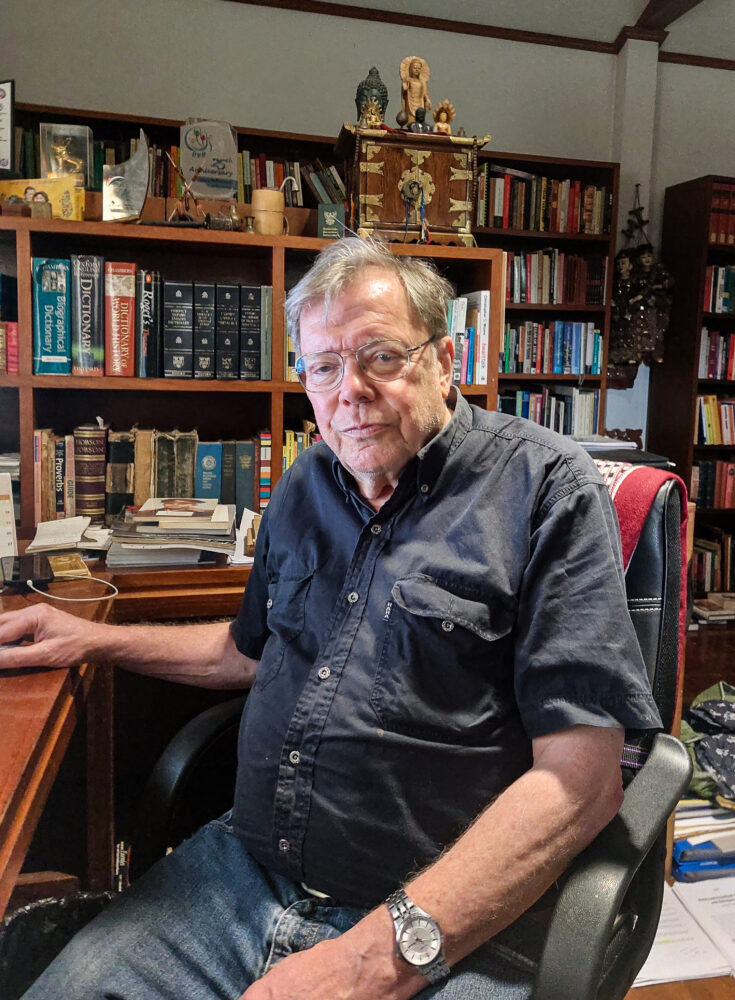
Swedish-born Bertil Lintner is a long-time expert in Myanmar and the ongoing war that plays out in the region. Even though the resistance groups are winning ground in recent months, Bertil Lintner is not optimistic about peace in the region.
The war in Myanmar is still raging on, as it has in the last 70 years. The resistance groups are winning ground in the western state of Rakhine, which has not gone unnoticed by newspapers worldwide. Some speculate, that the resistance groups maybe finally will have a chance to overthrow the military junta and the hope rises anew, that the decade-long conflict can finally simmer-down. But the Swedish Myanmar-expert Bertil Lintner does not believe the newest developments will significantly change the situation in Myanmar.
“The resistance is winning ground, but they are not winning the war. None of the resistance groups are strong enough to defeat the military. The only way to win is if the military cracks from within. And if it does, there will be an even nastier civil war. That is why I am not optimistic about the future,” Bertil Lintner says.
So far there haven’t been signs of splits in the military except a few desertations. The military keeps a firm grip on the center of the country, the Burmese heartland, whereas its’ control of the peripheries is slipping.
From Bertil Lintner’s home near Chiang Mai in Northern Thailand, he writes books on the 70-year-old war between the military junta and ethnic groups, which started as a democratic uprising, but now has turned violent. Behind him several brown bookcases display the depth of his knowledge on the Southeast Asian country.
Stacks of books, old archive files and newspaper cutouts cover his desk and parts of the floor, indicating the creation of his newest book “The Golden Land Ablaze” which will be published in September 2024, where he will transport the reader all the way back to colonial times. He has worked from Thailand, as he was banned from his country of expertise from 1981 to 2012 and then again after the military coup in 2021.
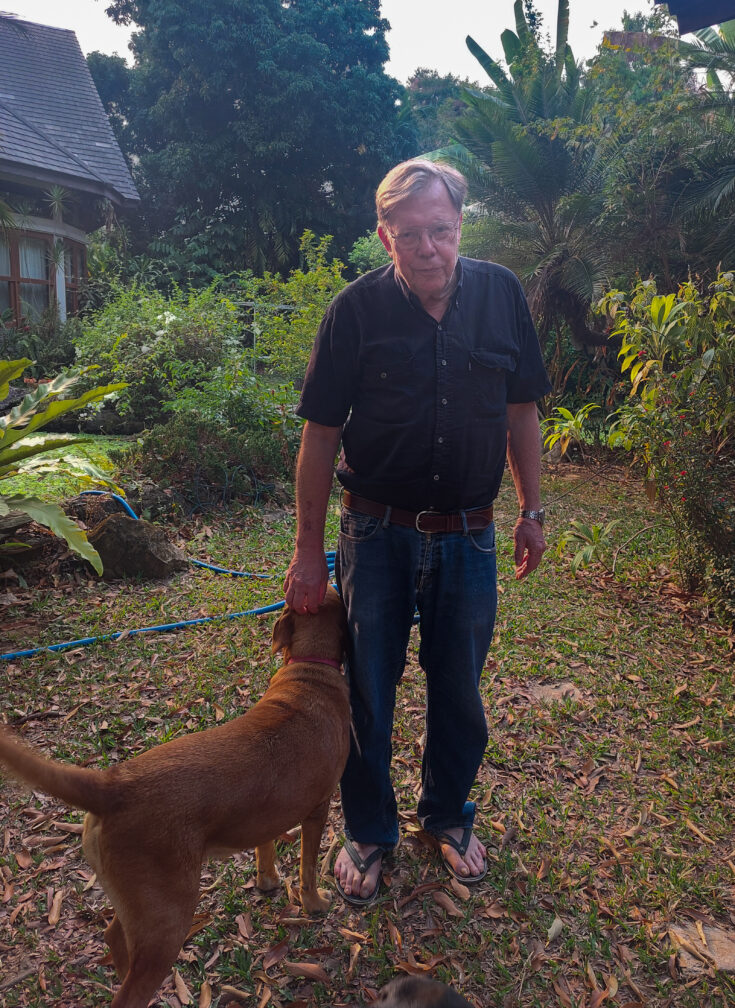
A spread-out resistance
According to Bertil Lintner, the goals of the resistance groups and more than 20 different rebel armies are too different for them to win the war. They have never been unified, and even though there is some communication between different armed groups there is no coordination.
There is no centralized supreme command, mapping out military strategies. Instead, there is a spread-out resistance working towards overthrowing the government. Furthermore, the towns sometimes clash over taxation-issues and control as they are essentially all still working towards their goals of defending their own communities.
“Their only common goal is to get rid of the military junta. But what if they succeed? It would be chaos,” Bertil Lintner says.
He takes a piece of Swedish snus, rolls it to a small ball with his fingers and places it under his upper lip, before he starts mapping out Myanmar’s ethnic composition.
According to the official policy of the ethnic groups, they would like to build a Myanmar federation split into the seven ethnic states: Mon, Karen, Shan, Kachin, Chin, Rakhine, Kayah, and Bamar. But in many of the states there is no rule of one singular ethnic group. There are large communities of other ethnicities in each of the states. For example, the Kachins aren’t even the majority in Kachin state and the Shah’s only make out 60 percent of the population in Shah state.
“How do you sort that out? Are we going to carve up the states into even smaller states? These are the issues that should be talking about. These are the situations we need workable solutions for if we want to impact the region,” says Bertil Lintner.
Another reason for the peace process being dragged out is the different groups’ lack of a wish for compromise.
“An old Burmese saying goes like this: it is like playing the violin for a water buffalo. It means they don’t even understand what is happening. The different groups don’t know peace,” Bertil Lintner says.
A young Burmese man
In 1977 Bertil Lintner set his feet on Burmese ground for the first time. On a road in downtown Rangoon, outside the Strand Hotel he was approached by a young man asking if he had whiskey or cigarettes – a common way for foreigners to exchange money to local currency at the time. But Bertil had already traded in his duty-free-bought goods for cash in the taxi from the airport, so he dismissed the young man.
The man asked if he had other things to sell like ballpoint pens or if he wanted to exchange money. Having just been in India for a couple of months and being used to crowded streets with a plethora of both sellers and hustlers, Bertil dismissed the man with short nos. “Please enjoy your stay sir, and thank you anyway,” the young man said. Bertil was so shocked at this young man’s politeness that he asked him to drink a cup of coffee with him.
They went to a coffee shop in a hotel and sat there the whole afternoon. The man told him the struggles of his home country, the dictatorship, and the militant suppression of ethnic groups. He told him about his friends who were arrested, in prison, had joined the armed struggles or were tortured. The conversation changed the young Swedes image of the country he was visiting in an instance.
“I thought that there is something sinister under this nice, structured façade of golden temples and smiling people,” Bertil Lintner says, as he recollects that fateful day almost 50 years ago.
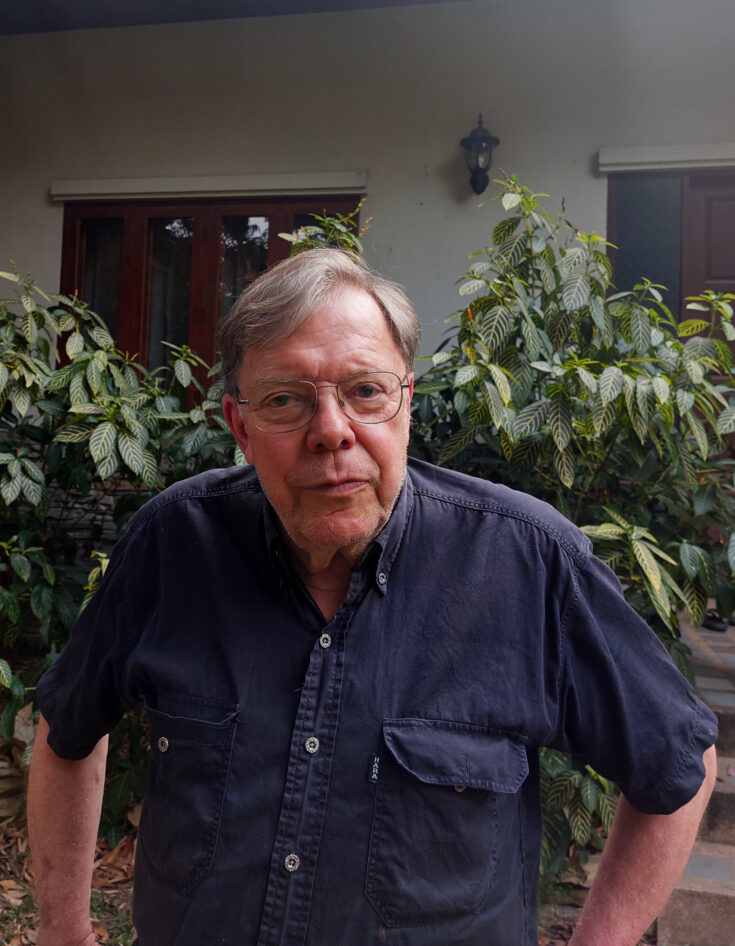
The effects of the war
And even though a lot has changed in the last 50 years, one thing hasn’t as the civilian population of Myanmar is still on the losing end of one of the longest ongoing conflicts worldwide. 70 years of crisis has taken its toll on the lives of civilians. Inflation has spiraled out of control, making food and necessities much more expensive. The same goes for real estate, as people with money in the conflict areas are buying property to have a safe retreat in areas such as Rangoon if things go bad.
In recent weeks there has been an additional wave of refugees from Myanmar, as the military junta rolled out mandatory conscription. This has led to young men fleeing the country to Bangladesh and Thailand, in order to avoid being enlisted in the army. Previously the army was on a volunteer basis, but now, not enough soldiers are wanting to join. The biggest motivating factor for joining the army are the benefits and access to goods like special schooling systems and hospitals. Many soldiers are village boys, who eye an opportunity to become someone of importance and do something meaningful.
Furthermore, there are hundreds of thousands of internally displaced people, who are refugees inside their own country. It is estimated that a third of the population in Myanmar are in need of humanitarian aid. But even though the war is gruesome, and many are affected, the international media in general isn’t as focused on the war in Myanmar as it is on other crises worldwide.
“I think Burma is too remote and too complicated to generate general interest. There are too many different groups and strange names, that no-one can pronounce. In terms of attention from the international community, they cannot compete with Ukraine or Gaza, even though the war is easily just as horribly as in Ukraine,” Bertil Lintner says.
A neo-colonial attitude
Bertil Lintner believes that the problem with Myanmar is, that no one has found out how to rule it. They haven’t found a formular that fits, and none of the attempts at peace have worked so far. According to Bertil Lintner the western nations’ inability to create peace is a consequence of them not knowing what they are doing, and a lack of historical knowledge.
“They just come in and they rush with models from Costa Rica, Colombia or Burkina Faso. They think it will work in Burma. And of course it doesn’t. Many western countries think they can sit down and talk to each other, which is fine. But if it was that easy, there wouldn’t have been a war in Burma for 70 years,” Bertil Lintner says.
The first peace plans in Burma were in the early 50’s. Then again in 1963, the 1970’s and the 1980’s.
“My question is, why are the peacemakers even a part of it. You need to look at history and realize that something is going wrong. Why should they be involved at all, they don’t have anything to do with it. It is a neo-colonial attitude,” Bertil Lintner says.
According to Bertil Lintner, other countries should contribute to civil society organizations, NGO’s and the media in Myanmar, if they want to get involved.
“Millions of dollars are wasted on meaningless peace processes, whereas the organizations, that are actually making a difference are only getting peanuts. They are struggling to survive and in desperate need of financial support,” Bertil Lintner says.

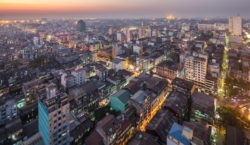
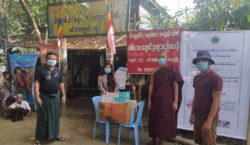


According to Bertil Lintner, other countries should contribute to civil society organizations, NGO’s and the media in Myanmar, if they want to get involved.
BUT THE MAIN THING IS EDUCATION ! NEED MORE HELP